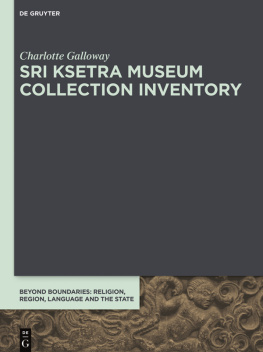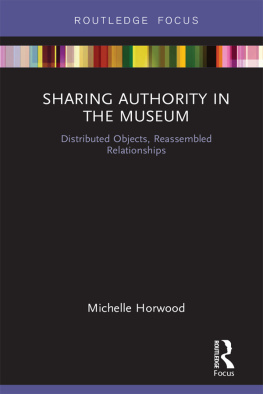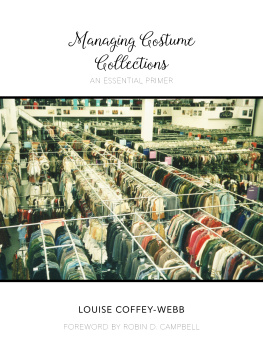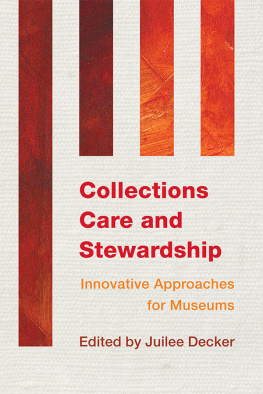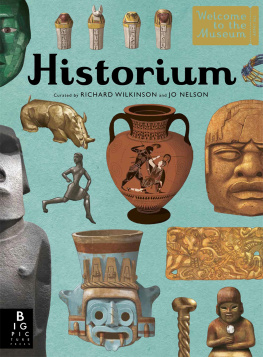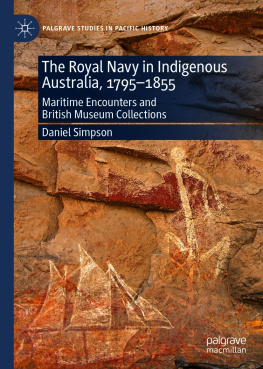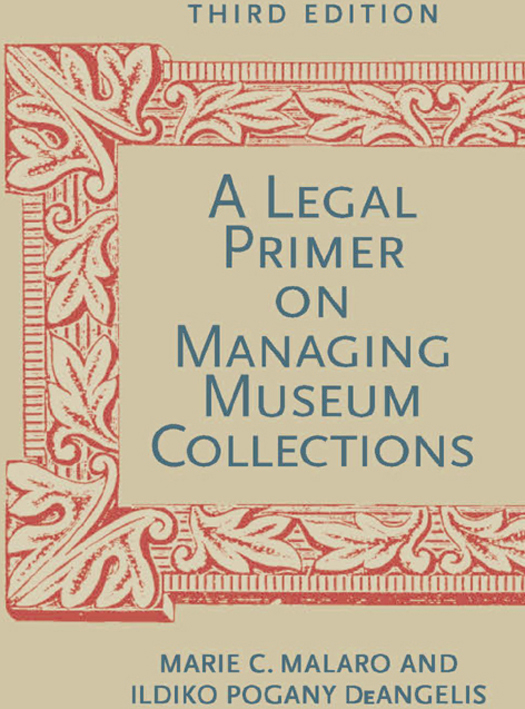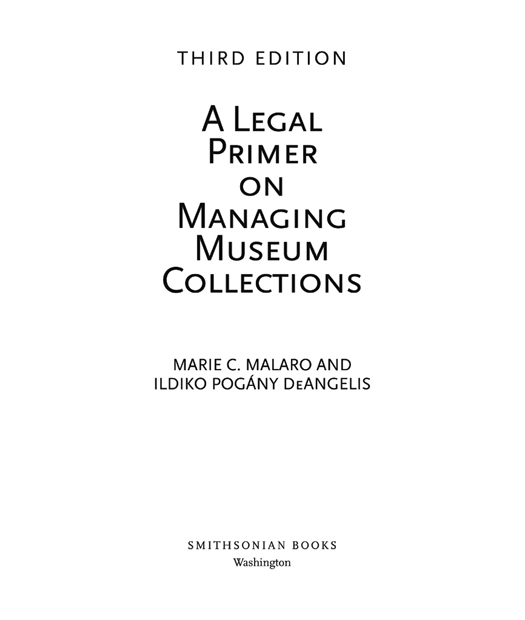Text 2012 by Marie C. Malaro and Ildiko P. DeAngelis
All rights reserved. No part of this publication may be
reproduced or transmitted in any form or by any means,
electronic or mechanical, including photocopying, recording,
or information storage or retrieval systems, without
permission in writing from the publishers.
Published by Smithsonian Books
Director: Carolyn Gleason
Production Editor: Christina Wiginton
Library of Congress Cataloging-in-Publication Data
Malaro, Marie C.
A legal primer on managing museum collections / Marie C. Malaro. 3rd ed.
p. cm.
Summary: A comprehensive and updated discussion of the legal questions faced by museums as they acquire, use, and refine their collectionsProvided by publisher.
eISBN: 978-1-58834-323-9
1. MuseumsLaw and legislationUnited States. I. Title.
KF4305.M35 2012
344.73093dc23
2011047586
v3.1
To my family: Jim, James Eaton, and Amy Louise
MCM
and
To Alex, Roxie, and Julie
and in memory of my parents, Andrs and Hortenzia Lers Pogny
IPD
Contents
Figures
Harvard University Statement on Acquisitions (1972)
Smithsonian Institution Statement on Acquisitions (1973)
Report of the Association of Art Museum Directors (AAMD) Taskforce on the Acquisition of Archaeological Material and Ancient Art (Revised 2008)
American Association of Museums (AAM) Standards Regarding Archaeological Material and Ancient Art (July 2008)
Copyright Duration Tables (2011)
VARA Waiver for Removal of Visual Art Incorporated into a Building
General VARA Waiver
Deed of Gift Samples
Sellers Warranty Samples
J. Paul Getty Museum Acquisition Policy (2006)
Agreement for Incoming Loan (History Museum)
Agreement for Incoming Loan (Art Museum)
Agreement for Outgoing Loan (History Museum)
Agreement for Outgoing Loan (Art Museum)
Agreement for Site-Specific Installation
Unclaimed Loans: State Statutes as of January 2010
Model Museum Unclaimed Property Law
Practical Guidelines for Resolving Unclaimed Loans
Sample Worksheet for Resolving Unclaimed Loans
Sample Letter of Notice to Terminate Loan
Sample Receipt and Waiver by Lender on Return of a Loaned Item
Deductible Chart, U.S. Indemnity Program
Sample Certificate of Indemnity, U.S. Indemnity Program
Checklist 1: Organizing International Exhibitions
Checklist 2: Loan Agreement between Organizer/Museum and Individual Lender
Checklist 3: Contract between Organizer/Museum and Borrower/Museum
Sample Temporary Custody Receipt Form
Pledge Forms
Sample Museum Policy Regarding Appraisals/Authentications
Release Form Regarding Appraisals/Authentications
Model Insurance Policy
Preface
In the early 1970s the Smithsonian Institution, with the cooperation of the American Association of Museums, joined with the American Law InstituteAmerican Bar Association (ALI-ABA) Committee on Continuing Professional Education to present an annual course of study entitled Legal Problems of Museum Administration. The purpose of the course was to highlight current legal issues that have relevance for the museum community. These issues were, and continue to be, numerous, varied, and often complex. Frequently, the more experienced professionals attending the course expressed dismay at the amount of material that had to be digested, so pity the novice who left with bulging briefcase and glazed eyes. Where to begin? How to survive? This book, like the original 1985 edition and the 1998 second edition, draws on our experience as frequent lecturers at the ALI-ABA seminars and as legal advisers for a major museum complex.
The book was written with particular purposes in mind. First of all, it is for the novice, whether he or she is the attorney who is occasionally called on to advise a museum or the new museum staff member or trustee who must wrestle with a myriad of administrative problems without the benefit of constant professional advice. For the nonlawyer, issues are explained simply, without heavy reliance on legal terminology. The objective is to give sufficient background information so that intelligent decisions can be made regarding the appropriate time to call legal counsel. The information contained in the book should not be considered legal advice or relied on as such. For the lawyer, there are case citations and references to legal texts and articles, which may aid in researching particular problems. Much of this legal reference material has been placed in footnotes. Footnotes are a necessary evil in any text that deals with the law. It is possible to state a legal principle or issue simply; the difficulty usually lies in applying that principle or issue to the situation at hand. Footnotes in close proximity to the text serve the lawyer, but they also remind the nonlawyer that invariably there are many ifs and buts to consider when making a legal judgment.
Second, the book focuses on collection-related issues. Legal Problems of Museum Administration (renamed Legal Issues in Museum Administration in 2006) can cover such varied topics as employee benefit plans, postal regulations, and stock loan programs, but information on these topics is available in many publications devoted to nonprofit organizations. Collections, on the other hand, are unique to museums. To keep this volume within reasonable limits, we have emphasized the legal problems associated with this distinctive feature.
Third, the book was written with an eye toward prevention. The best way to avoid legal entanglements is to think before acting. One must understand the obligations, the limits of authority, and the possible consequences of contemplated actions. Rather than offer a first-aid manual that lists instructions on how to handle each emergency situation, this text strives to encourage a thoughtful and well-informed approach to museum administration so that the patient can stay healthy. The book should be read with this in mind. Experience has demonstrated that many collection-related legal problems have no simple solutions, and once they have occurred, a museum has locked itself into painful expenditures of time and resources that could have been avoided. If the objective is to prevent such occurrences, a knowledge of legal ramifications must shape the way a museum approaches its collecting activity. In other words, legal advice is used most effectively in the policy-making process so that long-term consequences of actions can be considered before policy is established. Thus, we frequently drift into policy areas, and there is a bit of preaching here and there. Also, issues of particular interest to us receive more expansive treatment. Read the book, therefore, as two lawyers viewpoints on issues associated with collection management, and, by all means, feel free to disagree. Any issue of consequence deserves spirited debate.
Acknowledgments
In revising this book, we are greatly indebted to many of our professional colleagues who generously answered questions or provided background material. For this edition, our thanks go to Kathryn Glenn Speckart for the very useful unclaimed loan chart and to Diane Zorich for her insights into rights management. Special recognition is due Bonnie Morgan, who has served as the legal assistant for every edition of this book. She quickly proved to be irreplaceable.


